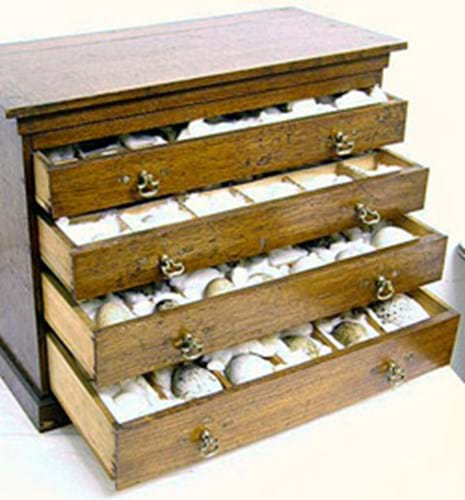
Jim Railton, of Railtons in Alnwick, who was unaware that the sale of any British wild bird egg is illegal, appeared in court last week following a joint investigation between Northumbria Police and The Royal Society for the Protection of Birds (RSPB).
The case has already become a cause célèbre, with national media interest and an outcry from some quarters at the level of police time and taxpayers' money devoted to the prosecution.
Mr Railton, an auctioneer of more than 30 years, included an Edwardian oak four-drawer cabinet containing a collection of birds' eggs at a sale in October 24-25 last year. The estimate was £30-40.
The RSPB received a tip-off from a member of the public and passed the details to Northumbria Police who sent two officers to the Old Narrowgate Salerooms in Alnwick to confiscate the cabinet during the viewing. They returned the following day to arrest Mr Railton.
He was subsequently interviewed in Berwick on three occasions before he was charged with two counts under the Wildlife and Countryside Act 1981. Specifically these are offering or exposing for sale wild birds' eggs and (via the publication of a catalogue) advertising wild birds' eggs for sale.
Northumbria Police, who worked with experts from the RSPB on the investigation, also interviewed the vendor Mark Goff, who had inherited the cabinet and its specimens from his mother. Mr Goff has not been charged.
The cabinet at the centre of the investigation contained 54 eggs, including those of kestrels, guillemots, herring gulls, razorbills and common garden species. Testimony to their vintage, most of the eggs were displayed alongside late 19th or early 20th century handwritten labels - although the case notes also include the vendor's recollection that he had added to the display as a child in the 1960s.
The RSPB declined to comment on the specifics of the ongoing Railton case, but a spokesman was happy to clarify the laws regarding the sale of birds' eggs covered under Part I of the Wildlife and Countryside Act 1981.
The law defines a wild bird as "any bird that is ordinarily resident in or is a visitor to Great Britain in a wild state". It does not include poultry, game birds (subject to conditions) and any bird bred in captivity.
While it is not illegal to own wild birds' eggs, it is unlawful to enter them into commerce. Unlike the international CITES legislation covering the sale of endangered species (which permits the sale of items worked prior to 1947), the law makes no allowance for the age or type of eggs or when they may have been collected.
Accordingly, while it is legal to sell a golden eagle mounted by an Edwardian taxidermist, it is illegal to sell the egg of a golden eagle of any age.
The maximum penalty for selling wild birds' eggs is a fine of £5000 per offence (under the law the presence of 54 eggs in this cabinet would count as 54 offences) and/or up to six months imprisonment.
Mr Railton (whose real name is Ian Wynne Prytherch) appeared briefly at Alnwick Magistrates Court on Wednesday, March 10 dressed in a blue suit, white shirt and an RSPB tie (he is a lapsed member of the UK charity). He gave an interview to BBC television cameras as interest in the case grew beyond the local press and concerns were raised over the use of police time and taxpayers' money to pursue it. The case was adjourned until March 31.
Mr Railton is as yet undecided on his plea. "I am culpable for the offence and I know ignorance is no defence," he told ATG shortly after his brief court appearance, "but I think it is a complete and utter waste of police time.
"They have interviewed me, taken my fingerprints, swabbed me for DNA, had RSPB specialist inspectors visit Berwick to look at the eggs, etc. It must have cost thousands, and all that needed to be done was to point out that I shouldn't be selling eggs."
He said he has received remarkable levels of public support - including offers to aid in legal fees to fight the prosecution - but is conscious that embarking upon a test case would be a time-consuming exercise.
Four years ago the proprietor of Willingham Auctions in Cambridgeshire was fined £6000 after offering wild birds' eggs for sale. Colin Peeke-Vout was handed the fine by Cambridge magistrates in April 2006 after pleading guilty to three charges of possession of, advertising and offering for sale 69 eggs from a collection formed in the 1960s with an estimate of £40-60.
By Roland Arkell




